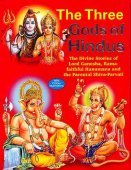Dhundhiraja, Ḍhuṇḍhirāja, Dhundhi-raja: 4 definitions
Introduction:
Dhundhiraja means something in Hinduism, Sanskrit. If you want to know the exact meaning, history, etymology or English translation of this term then check out the descriptions on this page. Add your comment or reference to a book if you want to contribute to this summary article.
In Hinduism
Purana and Itihasa (epic history)
Source: Wisdom Library: Skanda-puranaḌhuṇḍhirāja (ढुण्ढिराज) is another name for Ḍhuṇḍhi-vināyaka: a central deity of Kāśī (Vārāṇasī), to be worshipped by pilgrims on entrance to Kāśī, together with fifty-six vināyakas, according to the Kāśīkhaṇḍa (Skanda-purāṇa 4.2.57)

The Purana (पुराण, purāṇas) refers to Sanskrit literature preserving ancient India’s vast cultural history, including historical legends, religious ceremonies, various arts and sciences. The eighteen mahapuranas total over 400,000 shlokas (metrical couplets) and date to at least several centuries BCE.
Languages of India and abroad
Sanskrit dictionary
Source: Cologne Digital Sanskrit Dictionaries: Aufrecht Catalogus Catalogorum1) Ḍhuṇḍhirāja (ढुण्ढिराज) as mentioned in Aufrecht’s Catalogus Catalogorum:—father of Vināyaka Bhaṭṭa (Aṅgarejacandrikā 1801). Oxf. 134^a.
2) Ḍhuṇḍhirāja (ढुण्ढिराज):—Kāverīstotra.
3) Ḍhuṇḍhirāja (ढुण्ढिराज):—Cāturmāsyaprayoga Baudh. Haug. 34.
4) Ḍhuṇḍhirāja (ढुण्ढिराज):—son of Nṛsiṃha of Pārthapura, father of Gaṇeśa (Gaṇitamañjarī): Ṛṇabhaṅgādhyāya jy. B. 4, 116. Kuṇḍakalpalatā. [Mackenzie Collection] 31. K. 170. Grahaphalopapatti. Ben. 29. Grahalāghavodāharaṇa. Ben. 27. Jātakakaustubha. B. 4, 132. Jātakābharaṇa. Tājikabhūṣaṇa. L. 554. Tājikābharaṇa. B. 4, 146. Pañcāṅgaphala. B. 4, 152. Rājayogādhyāya jy. B. 4, 188. Śiṣṭādhyāya jy. B. 4, 198. Sudhārasakaraṇacashaka. Ben. 27. Sudhārasasāriṇī, a
—[commentary] on Ananta's Sudhārasa. Ben. 27.
5) Ḍhuṇḍhirāja (ढुण्ढिराज):—a descendant of Piṅgala: Abhinavakādambarī. Lakṣmīsahasraviṣamapadavyākhyā.
6) Ḍhuṇḍhirāja (ढुण्ढिराज):—Jātakasāra.
7) Ḍhuṇḍhirāja (ढुण्ढिराज):—Bhāṣāmañjarī.
8) Ḍhuṇḍhirāja (ढुण्ढिराज):—ḍhuṇḍhirāja, son of Puruṣottama, grandson of Rāmakṛṣṇa, pupil of Rāmapaṇḍita, the father of Nandapaṇḍita: Kuṇḍakalpalatā Io. 2720 (not by Dhuṇḍhirāja, son of Nṛsiṃha).
9) Ḍhuṇḍhirāja (ढुण्ढिराज):—son of Śrīraṅgabhaṭṭa: Bhāṣāmañjarī [grammatical]
Source: Cologne Digital Sanskrit Dictionaries: Monier-Williams Sanskrit-English Dictionary1) Ḍhuṇḍhirāja (ढुण्ढिराज):—[=ḍhuṇḍhi-rāja] [from ḍhuṇḍhi > ḍhuṇḍh] m. Name of the author of a work on nativities
2) [v.s. ...] of Bālakṛṣṇa’s father
3) [v.s. ...] of Vināyaka-bhaṭṭa’s father (about 1800 A.D.)
[Sanskrit to German]
Sanskrit, also spelled संस्कृतम् (saṃskṛtam), is an ancient language of India commonly seen as the grandmother of the Indo-European language family (even English!). Closely allied with Prakrit and Pali, Sanskrit is more exhaustive in both grammar and terms and has the most extensive collection of literature in the world, greatly surpassing its sister-languages Greek and Latin.
See also (Relevant definitions)
Partial matches: Dhundhi, Raja.
Starts with: Dhundhiraja lallopakhya, Dhundhiraja vyasa yajvan, Dhundhirajadistotra, Dhundhirajakhyana.
Ends with: Dikshita dhundhiraja, Dikshitadhundhiraja.
Full-text (+79): Dhundhirajakhyana, Kundakalpalata, Tajikabhushana, Dikshita dhundhiraja, Svargadvareshti, Sudharasa, Dhundhiraja lallopakhya, Rajayogadhyaya, Shishtadhyaya, Grahaphalopapatti, Pancangaphala, Mohashurottara, Jatakabharana, Abhinavakadambari, Rinabhangadhyaya, Gopala mishra, Ganitamanjari, Kaveristotra, Tajikabharana, Jatakakaustubha.
Relevant text
Search found 1 books and stories containing Dhundhiraja, Ḍhuṇḍhirāja, Dhundhi-raja, Ḍhuṇḍhi-rāja; (plurals include: Dhundhirajas, Ḍhuṇḍhirājas, rajas, rājas). You can also click to the full overview containing English textual excerpts. Below are direct links for the most relevant articles:
The Skanda Purana (by G. V. Tagare)
Chapter 57 - Manifestation of Dhuṇḍhi Vināyaka and Fifty-six Vināyakas < [Section 2 - Uttarārdha]
Chapter 69 - The Assembly of Sixty-eight Holy Spots < [Section 2 - Uttarārdha]
Chapter 58 - Attainment of Salvation by Divodāsa < [Section 2 - Uttarārdha]
Related products
